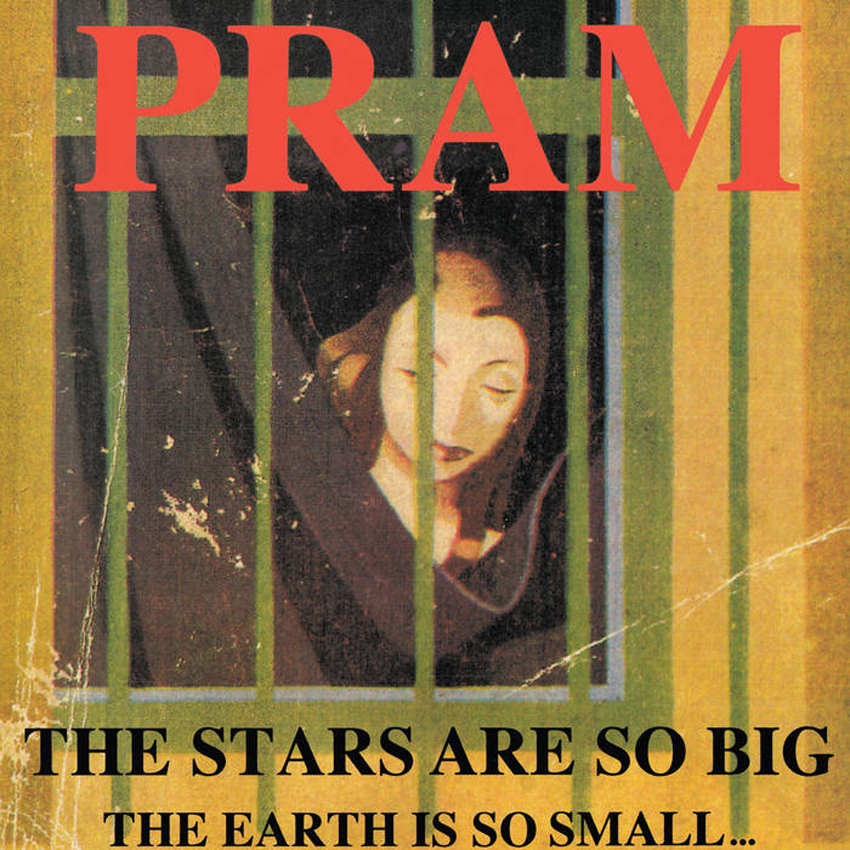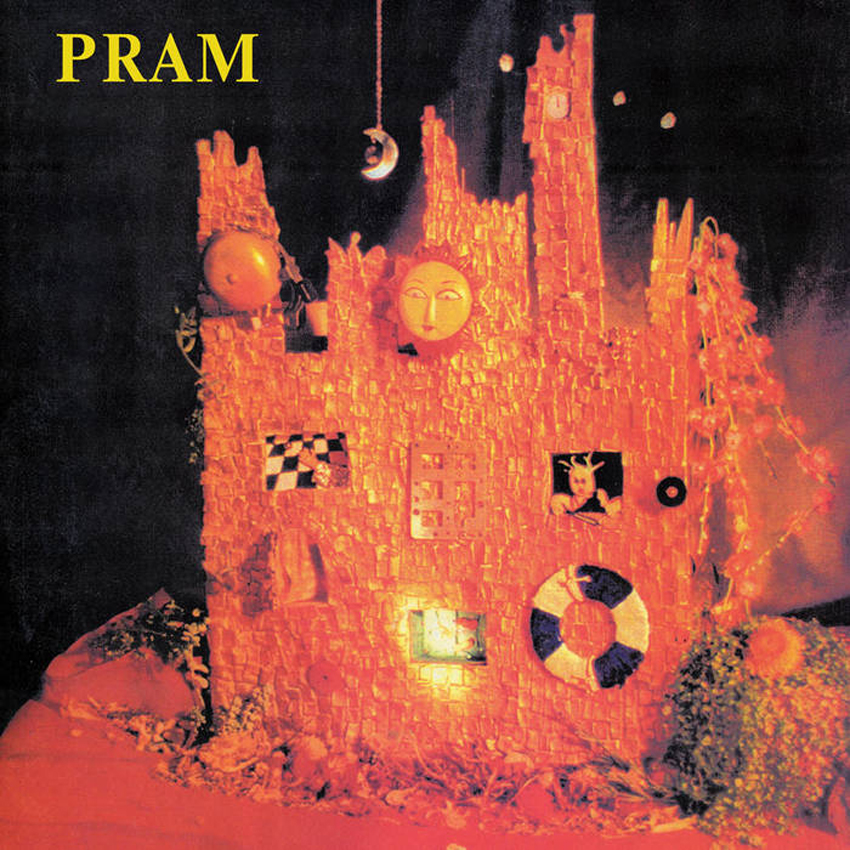 Birmingham’s Pram are the rare band that can cause me to simultaneously think conflicting thoughts like "it is absolutely criminal that this band was never as big as Stereolab" and "it is abundantly clear why this band never quite managed to transcend cult status."  In any case, they were unquestionably one of the more idiosyncratic, inspired, and polarizing bands of the '90s, though they finally managed to achieve some widespread success in the early 2000s.  In fact, Helium was recently hailed by FACT as one of the greatest post-rock albums of all-time, while an article on The Quietus proposed The Stars Are So Big as the best album of the '90s.  Appropriately, those first two Pram albums (originally released on Too Pure) have now gotten well-deserved vinyl reissues from Medical Records.  At the risk of sounding reductionist, both of these albums fall into Pram's Krautrock-influenced phase, preceding their (also reductionist) aesthetic swing into more exotica-influenced territory.  Describing Pram as "Krautrock-influenced" does not even remotely begin to capture how bizarre, artfully deranged, and fun some of these songs are though.
Birmingham’s Pram are the rare band that can cause me to simultaneously think conflicting thoughts like "it is absolutely criminal that this band was never as big as Stereolab" and "it is abundantly clear why this band never quite managed to transcend cult status."  In any case, they were unquestionably one of the more idiosyncratic, inspired, and polarizing bands of the '90s, though they finally managed to achieve some widespread success in the early 2000s.  In fact, Helium was recently hailed by FACT as one of the greatest post-rock albums of all-time, while an article on The Quietus proposed The Stars Are So Big as the best album of the '90s.  Appropriately, those first two Pram albums (originally released on Too Pure) have now gotten well-deserved vinyl reissues from Medical Records.  At the risk of sounding reductionist, both of these albums fall into Pram's Krautrock-influenced phase, preceding their (also reductionist) aesthetic swing into more exotica-influenced territory.  Describing Pram as "Krautrock-influenced" does not even remotely begin to capture how bizarre, artfully deranged, and fun some of these songs are though.
The Stars Are So Big… (1993) was Pram's debut album, released shortly after a pair of earlier EPs (one of which, the self-released Gash, was engineered by hometown compatriot Justin Broadrick).  While it is convenient and somewhat accurate to lump the band’s sound at this time together with Stereolab, the presence of vocalist Rosie Cuckston ensured that Pram were very much a singular identity.  Cuckston is a bit of a double-edged sword though, as she is revered by fans and absolutely integral to Pram's fundamental otherness, but she is a bit of an acquired taste for the unconverted.  While her vocals are generally described as "childlike," it actually feels more like the band just invited their terminally shy friend up on stage to sing for the first time...or maybe she just sounds like someone in a trance.  It is hard to say which is more accurate, but her vocal style is definitely very much all her own.  
In some respects, that is a bit problematic, as Rosie's distracted-sounding, quavering, and not entirely on-key vocals necessarily become the primary focus of every song, regardless of how interesting and inventive the underlying music can be.  In other respects, Cuckston is a crucially eerie, iconoclastic, and defining presence, though the rest of the band is hardly conventional (their original line-up was based solely upon vocals and theremin, for example).  Therein lies the central paradox and complexity of Pram: their most obviously inaccessible feature is also one of the most essential and beloved aspects of their aesthetic.  I am personally still a bit on the fence regarding Cuckston's vocals, but I am gradually coming around, as she is a one-of-a-kind songwriter.  Cuckston aside, the other huge difference between Stereolab and Pram is that they assimilated the same influences in very different ways: Stereolab did it sauvely, while Pram turned out like a messy, precarious, and freewheeling circus.
From a pop music perspective, "Radio Freak in a Storm" is the definite high point of the album, boasting a wonderfully plinking arpeggio hook, a cool keyboard melody, and a pleasantly swaying groove.  Pram clearly were not too worried about trying to write catchy singles though, as the song frequently derails into dissonant interludes of gnarled strings.  Elsewhere, "The Ray" is quite an unusual and noteworthy piece, as the backing music is just a sparse keyboard melody and some howling noise.  As far as I am concerned, however, the real zenith of The Stars Are So Big is unquestionably the gorgeous 16-minute epic "In Dreams You Too Can Fly."  In fact, it may very well be the crown jewel of Pram's entire career.  While Cuckston eventually starts singing near the end, the piece is primarily an instrumental and it captures the band at the absolute height of their powers.  I have absolutely no idea who is playing what instrument, but the roiling guitar maintains a smoldering tension worthy of Sonic Youth and the rhythm section keeps the momentum building wonderfully as an extended and surprisingly great trumpet solo unfolds.  In short, it captures the entire band performing at their absolute best without the distraction of trying to shape themselves into an accessible song-like shape.  It is a truly wonderful piece of music.  The remainder of these eight songs certainly all have their nice touches too, but "In Dreams You Too Can Fly" is the real reason to hear this album. For the most part, Pram got noticeably better with their next release.

On that note, the following "Dancing on a Star" is even better, veering off into quite a bit of spaced-out abstraction while still managing to stay grounded with a wonderfully rolling and stumbling groove.  In fact, I can think of few other bands that ever managed to get quite as crazy and outré as Pram do here while still managing to loosely adhere to something resembling conventional song-like structures.  "Nightwatch" is even more bonkers, as it sounds like there is simultaneously someone banging on kitchen utensils; a very serious violinist trying to hold the song together; a wobbly, weirdly bass-heavy theremin; a lazily melodic one-finger keyboard melody; and a gnarled eruption of guitar feedback all happening at once.  The overall effect is like looking into a snow globe that portrays a spirited talent show in a psych ward.  I think that statement effectively summarizes early Pram in general, actually: I cannot stress enough how improbably far out Pram managed to go while still masquerading as a pop/rock band.  I doubt it was completely intentional, but the contrast between Cuckston's vocals and the band's music was a stroke of genius.  Having a seemingly guileless and starry-eyed poet as a front person is the perfect distracting cover for a band endlessly hellbent on conjuring up such a perverse, everything-but-the-kitchen-sink cacophony.
As bizarre as things gets, it is generally the rhythm section that makes Helium work so well, as even the slightest content is bolstered by an unrelenting momentum.  Cuckston’s lyrics aside, there is not much at all to "Things Left on the Pavement" other than a solid bass line and some very spirited drumming.  Nevertheless, that proves to be more than enough to carry the song (though it helps that it eventually erupts into a wild interlude of yelping, jungle-like noises).  Though the band can sound quite mannered on record at times, it is easy to see how such unpredictable frenzies of chaos made Pram a somewhat legendary live act.  Interestingly, however, it is one of the more straightforward and Cuckston-centric pieces that steals the show: the lilting and melancholy "My Father the Clown."  While there is predictably a complete collapse into abstract lunacy near the end, the appeal is solely that it is absolutely perfect song with an absolutely perfect melody.
Sadly, "Clown" does not sustain its greatness for its entire duration due to Pram's genius for self-sabotage, but it still hits the highest highs of anything on the album.  That is quite an achievement, as Helium is positively riddled with fine moments.  While the depth and poignancy of "Clown" is a bit of an aberration, it is pieces like the rollicking "Blue" and "Dancing on a Star" that most effectively embody Helium's spirit, which is one of infectiously unhinged fun and cheerfully wonky experimentation.  Recognizing Helium as a crucial post-rock album is great, but that fails to convey how truly bizarre and uncategorizable it actually is.  "Post-rock" is only a vaguely plausible label here because there is not currently a "weird, carnival-esque, and introverted party album" genre.  In a perfect world, Helium would have birthed it, but it would have been a damn hard act for anyone else to follow.
 
Read More

